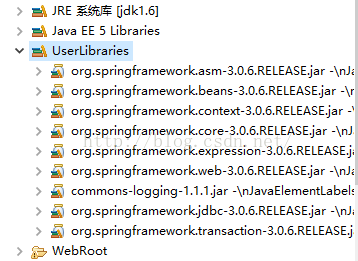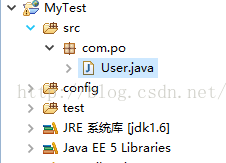以下是一个最简单的示例
1、新建一个标准的javaweb项目

2、导入spring所需的一些基本的jar包

3、配置web.xml文件
<?xml version="1.0" encoding="UTF-8"?>
<web-app version="2.5"
xmlns="http://java.sun.com/xml/ns/javaee"
xmlns:xsi="http://www.w3.org/2001/XMLSchema-instance"
xsi:schemaLocation="http://java.sun.com/xml/ns/javaee
http://java.sun.com/xml/ns/javaee/web-app_2_5.xsd">
<!-- 应用程序Spring上下文配置 -->
<context-param>
<param-name>contextConfigLocation</param-name>
<param-value>
classpath*:applicationContext*.xml,
</param-value>
</context-param>
<!-- spring上下文加载监听器 -->
<listener>
<listener-class>
org.springframework.web.context.ContextLoaderListener
</listener-class>
</listener>
<welcome-file-list>
<welcome-file>index.jsp</welcome-file>
</welcome-file-list>
</web-app>
4、添加spring配置文件applicationContext

5、对applicationContext.xml文件做最简单的配置
<?xml version="1.0" encoding="UTF-8"?>
<beans xmlns="http://www.springframework.org/schema/beans"
xmlns:xsi="http://www.w3.org/2001/XMLSchema-instance"
xsi:schemaLocation="http://www.springframework.org/schema/beans http://www.springframework.org/schema/beans/spring-beans-3.0.xsd"
default-lazy-init="false" default-autowire="byName">
<bean id="user" class="com.po.User">
<property name="name" value="张三"/>
</bean>
</beans>
beans——xml文件的根节点。
xmlns——是XMLNameSpace的缩写,因为XML文件的标签名称都是自定义的,自己写的和其他人定义的标签很有可能会重复命名,而功能却不一样,所以需要加上一个namespace来区分这个xml文件和其他的xml文件,类似于java中的package。
xmlns:xsi——是指xml文件遵守xml规范,xsi全名:xmlschemainstance,是指具体用到的schema资源文件里定义的元素所准守的规范。即/spring-beans-2.0.xsd这个文件里定义的元素遵守什么标准。
xsi:schemaLocation——是指,本文档里的xml元素所遵守的规范,schemaLocation属性用来引用(schema)模式文档,解析器可以在需要的情况下使用这个文档对XML实例文档进行校验。它的值(URI)是成对出现的,第一个值表示命名空间,第二个值则表示描述该命名空间的模式文档的具体位置,两个值之间以空格分隔。
6、新建一个实体类User.java

package com.po;
public class User {
private String name;
private String age;
public String getName() {
return name;
}
public void setName(String name) {
this.name = name;
}
public String getAge() {
return age;
}
public void setAge(String age) {
this.age = age;
}
}
7、测试
public static void main(String[] args) {
// TODO Auto-generated method stub
ApplicationContext ac = new FileSystemXmlApplicationContext("config/applicationContext.xml");
User user =(User)ac.getBean("user");
System.out.println(user.getName());
}
输出

这就实现web项目搭建基础spring框架。接下来就做一些真正项目中会用到的一些扩展
可以在web.xml中配置一些spring框架集成的功能或其他设置
<!-- 字符编码过滤器,必须放在过滤器的最上面 -->
<filter>
<filter-name>encodingFilter</filter-name>
<filter-class>org.springframework.web.filter.CharacterEncodingFilter</filter-class>
<init-param>
<param-name>forceEncoding</param-name>
<param-value>true</param-value>
</init-param>
<init-param>
<param-name>encoding</param-name>
<param-value>UTF-8</param-value>
</init-param>
</filter>
<filter-mapping>
<filter-name>encodingFilter</filter-name>
<url-pattern>/*</url-pattern>
</filter-mapping>
<!-- 配置延迟加载时使用OpenSessionInView-->
<filter>
<filter-name>openSessionInViewFilter</filter-name>
<filter-class>
org.springframework.orm.hibernate3.support.OpenSessionInViewFilter
</filter-class>
<init-param>
<param-name>singleSession</param-name>
<param-value>true</param-value>
</init-param>
<init-param>
<param-name>sessionFactoryBeanName</param-name>
<!--指定对Spring配置中哪个sessionFactory使用OpenSessionInView-->
<param-value>sessionFactory</param-value>
</init-param>
</filter>
<filter-mapping>
<filter-name>openSessionInViewFilter</filter-name>
<url-pattern>/*</url-pattern>
</filter-mapping>
<!-- spring security过滤器 org.springframework.web.filter.DelegatingFilterProxy(委托过滤器代理)-->
<!-- 使用springSecurity或apache shiro就会用到这个过滤器,-->
<filter>
<filter-name>springSecurityFilterChain</filter-name>
<filter-class>org.springframework.web.filter.DelegatingFilterProxy</filter-class>
</filter>
<filter-mapping>
<filter-name>springSecurityFilterChain</filter-name>
<url-pattern>/*</url-pattern>
</filter-mapping>
<!-- 声明 Spring MVC DispatcherServlet -->
<servlet>
<servlet-name>springDispatcher</servlet-name>
<servlet-class>org.springframework.web.servlet.DispatcherServlet</servlet-class>
<init-param>
<param-name>contextConfigLocation</param-name>
<param-value>classpath*:spring-mvc.xml</param-value>
</init-param>
<load-on-startup>1</load-on-startup>
</servlet>
<!-- map all requests for /* to the dispatcher servlet -->
<servlet-mapping>
<servlet-name>springDispatcher</servlet-name>
<url-pattern>/</url-pattern>
</servlet-mapping>
<!-- 配置出错页面 -->
<error-page>
<error-code>404</error-code>
<location>errorpage/404.jsp</location>
</error-page>
<!-- 401错误 -->
<error-page>
<error-code>401</error-code>
<location>/errorpage/401.html</location>
</error-page>
<!-- 为每个jsp页面引入taglib.jspf等文件 -->
<jsp-config>
<taglib>
<taglib-uri>/WEB-INF/runqianReport4.tld</taglib-uri>
<taglib-location>/WEB-INF/runqianReport4.tld</taglib-location>
</taglib>
<jsp-property-group>
<url-pattern>*.jsp</url-pattern>
<page-encoding>UTF-8</page-encoding>
<include-prelude>/tag/taglib.jspf</include-prelude>
<!--<trim-directive-whitespaces>true</trim-directive-whitespaces> -->
</jsp-property-group>
</jsp-config>
其中jspf就是做一些全局的声明
<%@ page language="java" contentType="text/html; charset=UTF-8"
<span > </span>pageEncoding="UTF-8"%>
<%@ taglib prefix="c" uri="http://java.sun.com/jsp/jstl/core"%>
<%@ taglib prefix="fn" uri="http://java.sun.com/jsp/jstl/functions"%>
<%@ taglib prefix="fmt" uri="http://java.sun.com/jsp/jstl/fmt"%>
<%@ taglib prefix="fnc" uri="/WEB-INF/tlds/fnc.tld" %>
<%@ taglib tagdir="/WEB-INF/tags" prefix="mytag"%>
<c:set var="ctx" scope="session"
<span > </span>value="${pageContext.request.contextPath}" />
可以在applicationContext.xml中配置更多的功能
<!-- beans可以添加更多声明 -->
<beans xmlns="http://www.springframework.org/schema/beans"
xmlns:xsi="http://www.w3.org/2001/XMLSchema-instance" xmlns:jee="http://www.springframework.org/schema/jee"
xmlns:tx="http://www.springframework.org/schema/tx" xmlns:aop="http://www.springframework.org/schema/aop"
xmlns:context="http://www.springframework.org/schema/context"
xmlns:mvc="http://www.springframework.org/schema/mvc"
xsi:schemaLocation="http://www.springframework.org/schema/beans http://www.springframework.org/schema/beans/spring-beans-3.0.xsd
http://www.springframework.org/schema/jee http://www.springframework.org/schema/jee/spring-jee.xsd
http://www.springframework.org/schema/aop http://www.springframework.org/schema/aop/spring-aop-3.0.xsd
http://www.springframework.org/schema/tx http://www.springframework.org/schema/tx/spring-tx-3.0.xsd
http://www.springframework.org/schema/context http://www.springframework.org/schema/context/spring-context.xsd
http://www.springframework.org/schema/mvc http://www.springframework.org/schema/mvc/spring-mvc-3.0.xsd"
default-lazy-init="false" default-autowire="byName">
<!-- 使用注解定义切面 -->
<aop:aspectj-autoproxy />
<mvc:annotation-driven />
<!-- spring 注释代替配置,自动扫描的基础包,将扫描该包以及所有子包下的所有类需要把controller去掉,否则影响事务管理 -->
<context:component-scan base-package="com.schoolnet">
<context:exclude-filter type="annotation" expression="org.springframework.stereotype.Controller" />
</context:component-scan>
<!-- 配置系统properties配置文件 -->
<bean id="propertyConfigurer"
class="org.springframework.beans.factory.config.PropertyPlaceholderConfigurer">
<property name="fileEncoding" value="UTF-8" />
<property name="locations">
<list>
<value>classpath:jdbc.properties</value>
</list>
</property>
</bean>
<!-- 数据源配置 -->
<bean id="dataSource" class="com.mchange.v2.c3p0.ComboPooledDataSource"
destroy-method="close">
<property name="driverClass" value="${jdbc.driverClassName}" />
<property name="jdbcUrl" value="${jdbc.url}" />
<property name="user" value="${jdbc.username}" />
<property name="password" value="${jdbc.password}" />
<property name="minPoolSize">
<value>1</value>
</property>
<property name="maxPoolSize" value="100" />
<property name="initialPoolSize" value="3" />
<!--最大空闲时间,60秒内未使用则连接被丢弃。若为0则永不丢弃。Default: 0 -->
<property name="maxIdleTime" value="60" />
<!--当连接池中的连接耗尽的时候c3p0一次同时获取的连接数。Default: 3 -->
<property name="acquireIncrement" value="5" />
<property name="maxStatements" value="0" />
<!--每60秒检查所有连接池中的空闲连接。Default: 0 -->
<property name="idleConnectionTestPeriod" value="60" />
<!--定义在从数据库获取新连接失败后重复尝试的次数。Default: 30 -->
<property name="acquireRetryAttempts" value="30" />
<!-- 获取连接失败将会引起所有等待连接池来获取连接的线程抛出异常。但是数据源仍有效 保留,并在下次调用getConnection()的时候继续尝试获取连接。如果设为true,那么在尝试
获取连接失败后该数据源将申明已断开并永久关闭。Default: false -->
<property name="breakAfterAcquireFailure" value="false" />
<!-- 因性能消耗大请只在需要的时候使用它。如果设为true那么在每个connection提交的 时候都将校验其有效性。建议使用idleConnectionTestPeriod或automaticTestTable
等方法来提升连接测试的性能。Default: false -->
<property name="testConnectionOnCheckout" value="false" />
</bean>
<!-- 定义事务管理器(声明式的事务)-->
<!-- 支持 @Transactional 标记 -->
<!-- 方式一:DataSourceTransactionManager -->
<bean id="transactionManager"
class="org.springframework.jdbc.datasource.DataSourceTransactionManager">
<property name="dataSource" ref="dataSource" />
</bean>
<tx:annotation-driven transaction-manager="transactionManager"/>
<!-- 方式二:hibernateTransactionManager -->
<bean id="hibernateTransactionManager"
class="org.springframework.orm.hibernate3.HibernateTransactionManager">
<property name="sessionFactory">
<ref local="sessionFactory" />
</property>
</bean>
<!-- 配置hibernate的session工厂 -->
<bean id="sessionFactory"
class="org.springframework.orm.hibernate3.LocalSessionFactoryBean">
<property name="dataSource" ref="dataSource" />
<property name="lobHandler" ref="lobHandler"/>
<property name="mappingLocations">
<list>
<value>classpath*:/com/schoolnet/**/*.hbm.xml</value>
</list>
</property>
<property name="hibernateProperties">
<props>
<!-- 解决在Oracle多个表空间表名相同导致hibernate不会自动生成表 -->
<prop key="hibernate.default_schema">${jdbc.username}</prop>
<prop key="hibernate.dialect">
org.hibernate.dialect.Oracle10gDialect
</prop>
<prop key="hibernate.show_sql">true</prop>
<!--解决内存泄漏问题 -->
<prop key="hibernate.generate_statistics">false</prop>
<prop key="hibernate.connection.release_mode">
auto
</prop>
<prop key="hibernate.autoReconnect">true</prop>
<prop key="hibernate.cache.provider_class">
org.hibernate.cache.EhCacheProvider
</prop>
<!--解决内存泄漏问题 -->
<prop key="hibernate.cache.use_query_cache">false</prop>
<prop key="use_second_level_cache">false</prop>
<prop key="hibernate.hbm2ddl.auto">update</prop>
<prop key="current_session_context_class">thread</prop>
</props>
</property>
<property name="eventListeners">
<map>
<entry key="merge">
<bean
class="org.springframework.orm.hibernate3.support.IdTransferringMergeEventListener" />
</entry>
</map>
</property>
</bean>
<!--2.配置Hibernate事务特性 -->
<tx:advice id="txAdvice" transaction-manager="hibernateTransactionManager">
<tx:attributes>
<tx:method name="save*" propagation="REQUIRED" rollback-for="Exception" />
<tx:method name="add*" propagation="REQUIRED" rollback-for="Exception" />
<tx:method name="update*" propagation="REQUIRED" rollback-for="Exception" />
<tx:method name="modify*" propagation="REQUIRED" rollback-for="Exception" />
<tx:method name="del*" propagation="REQUIRED" rollback-for="Exception" />
<tx:method name="start*" propagation="REQUIRED" rollback-for="Exception" />
<tx:method name="stop*" propagation="REQUIRED" rollback-for="Exception" />
<tx:method name="assign*" propagation="REQUIRED" rollback-for="Exception" />
<tx:method name="clear*" propagation="REQUIRED" rollback-for="Exception" />
<tx:method name="execute*" propagation="REQUIRED" rollback-for="Exception" />
<tx:method name="insert*" propagation="REQUIRED" rollback-for="Exception" />
<tx:method name="do*" propagation="REQUIRED" rollback-for="Exception" />
<tx:method name="set*" propagation="REQUIRED" rollback-for="Exception" />
<tx:method name="*N" propagation="NEVER" />
<tx:method name="*" read-only="true"/>
</tx:attributes>
</tx:advice>
<!-- 配置那些类的方法进行事务管理 -->
<aop:config>
<aop:advisor pointcut="execution(* com.eshine..*.service.*.*(..))"
advice-ref="txAdvice" />
</aop:config>
spring-mvc.xml文件配置
<?xml version="1.0" encoding="UTF-8"?>
<beans xmlns="http://www.springframework.org/schema/beans" xmlns:xsi="http://www.w3.org/2001/XMLSchema-instance" xmlns:jee="http://www.springframework.org/schema/jee"
xmlns:tx="http://www.springframework.org/schema/tx" xmlns:aop="http://www.springframework.org/schema/aop"
xmlns:context="http://www.springframework.org/schema/context" xmlns:mvc="http://www.springframework.org/schema/mvc"
xsi:schemaLocation="http://www.springframework.org/schema/beans http://www.springframework.org/schema/beans/spring-beans.xsd
http://www.springframework.org/schema/jee http://www.springframework.org/schema/jee/spring-jee.xsd
http://www.springframework.org/schema/aop http://www.springframework.org/schema/aop/spring-aop-3.0.xsd
http://www.springframework.org/schema/tx http://www.springframework.org/schema/tx/spring-tx-3.0.xsd
http://www.springframework.org/schema/context http://www.springframework.org/schema/context/spring-context-3.0.xsd
http://www.springframework.org/schema/mvc http://www.springframework.org/schema/mvc/spring-mvc-3.0.xsd">
<context:component-scan base-package="com.schoolnet" use-default-filters="false">
<context:include-filter type="annotation" expression="org.springframework.stereotype.Controller" />
</context:component-scan>
<mvc:annotation-driven />
<mvc:default-servlet-handler />
<!-- jsp视图解析器 -->
<bean id="jspViewResolver" class="org.springframework.web.servlet.view.InternalResourceViewResolver">
<property name="prefix" value="/" />
<property name="suffix" value=".jsp" />
<property name="order" value="0" />
<property name="contentType" value="text/html;charset=UTF-8" />
</bean>
<!--多文上传,限制1G文件 -->
<bean id="multipartResolver" class="org.springframework.web.multipart.commons.CommonsMultipartResolver">
<property name="maxUploadSize" value="1073741824" />
</bean>
</beans>
总结
以上就是本文关于Spring框架web项目实战全代码分享的全部内容,希望对大家有所帮助。感兴趣的朋友可以继续参阅本站:
springmvc Rest风格介绍及实现代码示例
SpringMVC拦截器实现单点登录
Spring集成Redis详解代码示例
如有不足之处,欢迎留言指出。感谢朋友们对本站的支持!
免责声明:本站发布的内容(图片、视频和文字)以原创、转载和分享为主,文章观点不代表本网站立场,如果涉及侵权请联系站长邮箱:is@yisu.com进行举报,并提供相关证据,一经查实,将立刻删除涉嫌侵权内容。